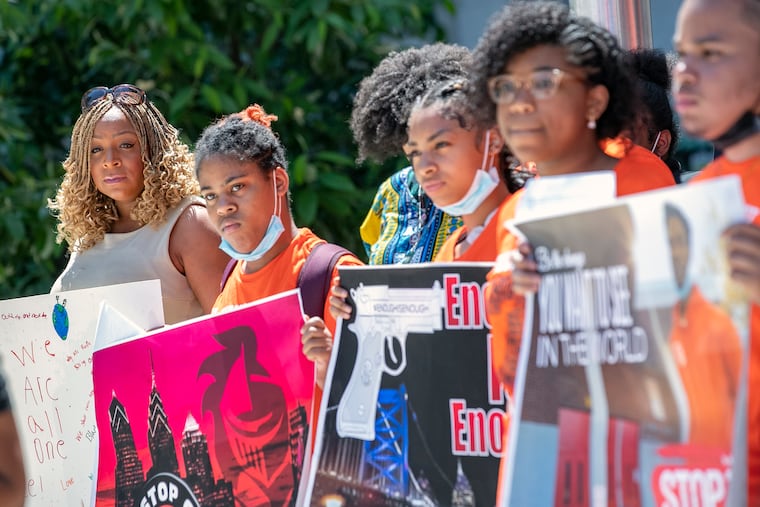
As emergency physicians and trauma surgeons at Penn Presbyterian Medical Center’s emergency department, we deliver terrible news almost daily.
“I’m sorry, but I don’t have good news. Your son came in to us after being shot. Despite our team’s best efforts, his injuries were too severe, and he died.”
We are met with either silence or wailing. Both are deafening.
Lives change forever in that room. Over the last several years, emergency medical professionals have had little time to grieve before we are pulled back into the trauma bay to treat the next gunshot victim.
The cycle of gun violence in Philadelphia is sickening. To date, there have been over 200 homicides in 2022, with 40 people shot and 14 killed over Memorial Day weekend. When faced with violence of this magnitude, we have two options: to sit on our hands and do nothing or to stand up and take action.
Since 2020, we’ve been out on the street meeting with the city’s many community violence prevention groups, such as Mothers In Charge and Father’s Day Rally Committee, attending vigils for victims, speaking to Councilmembers Kenyatta Johnson and Jamie Gauthier, and working with colleagues at the Penn Injury Science Center to develop and distribute evidence-based information on the effects of gun violence.
No meaningful legislation to tackle gun violence has been passed in the Pennsylvania General Assembly in almost four years. Since then, about 6,000 people have died in Pennsylvania from gun violence. Nationwide, we see a similar picture. Despite catastrophic, recurrent tragedies — most recently at the Tops grocery store in Buffalo, N.Y., and Robb Elementary School in Uvalde, Texas — moves to change gun-related legislation are at a standstill.
As Pennsylvanians, we need to push our state lawmakers to use their power to enact gun laws that could save lives. Yet, too often the issue becomes a partisan back-and-forth.
Finding common ground
There are ways for Democrats and Republicans to come together on gun control. It requires reframing the conversation. We saw this in April when we joined CeaseFirePA, a statewide organization addressing the gun violence epidemic, at their gun violence advocacy day in Harrisburg.
When we took the time to explain some of the proposed bills currently stagnating in committee — for example, those aiming to close background check gaps on private sales of long guns, mandatory reporting of lost or stolen firearms, increasing investment in safer communities, and passing extreme risk protection orders — even die-hard “protect the Second Amendment” gun owners stopped to listen.
A few proposals are especially promising. In the last year, the state allocated about $45 million to the Pennsylvania Commission on Crime and Delinquency’s School Safety and Security Grants Program for community violence prevention. Increasing this funding allocation to approximately $80 million would allow many community groups and organizations (including hospitals such as Children’s Hospital of Philadelphia, Temple University Hospital, and the University of Pennsylvania Hospital) to continue their work around community gun violence prevention.
When we explained the proposal of passing extreme risk protection orders (ERPOs) to a Republican staffer, we were met with an understanding nod. This staffer had lost a loved one to suicide using a firearm and had hoped there had been a legal way for that person’s firearm to have been taken away from them until they could get help.
Almost 1,000 suicides per year in Pennsylvania involve firearms. Suicide attempts are much more likely to be successful if a gun is used. Family or friends, often the first to notice a crisis, can help prevent suicide by temporarily removing that person’s firearm. Currently, the only protective legal mechanism in the commonwealth is through involuntary commitment to a mental health facility. This makes it more difficult for that person to get their weapon back when they have been treated.
ERPOs provide a legal mechanism for law enforcement to remove the weapon for up to a year and prevent the person from buying a new weapon while they are at risk. States instituting ERPOs such as Connecticut and Indiana have seen 12%-18% reductions in suicides. ERPO use in California showed that it could even reduce the incidence of mass shootings.
» READ MORE: What are we actually praying for when we call for ‘thoughts and prayers’?
Accountability and action
Elections are around the corner, and as voters, we can hold our elected officials accountable. While “they’re after our guns” makes for a good political line, maintaining partisan politics only leads to the continued maiming or killing of family members or friends standing on either side of the aisle. What we saw in Harrisburg is that if lawmakers stop hiding behind their party rhetoric and instead clearly explain proposed bills, then gun owners will pay attention.
But gun laws save lives only if they are passed.
We ask that you meet with your lawmakers in their offices or on their campaign trails and have them get into the weeds of why they are so adamant to prevent these bills from being passed — or why they are still not doing enough to pass them. They depend on our votes and they should earn them.
As trauma clinicians on the front line, we don’t want to keep returning to the family room to tell another mother that their child is dead.
Zaffer Qasim is an assistant professor of emergency medicine and critical care at the University of Pennsylvania Penn Presbyterian Medical Center. @ResusOne Chidinma Nwakanma is an assistant professor of emergency medicine at the University of Pennsylvania Penn Presbyterian Medical Center. @Chidi_MD